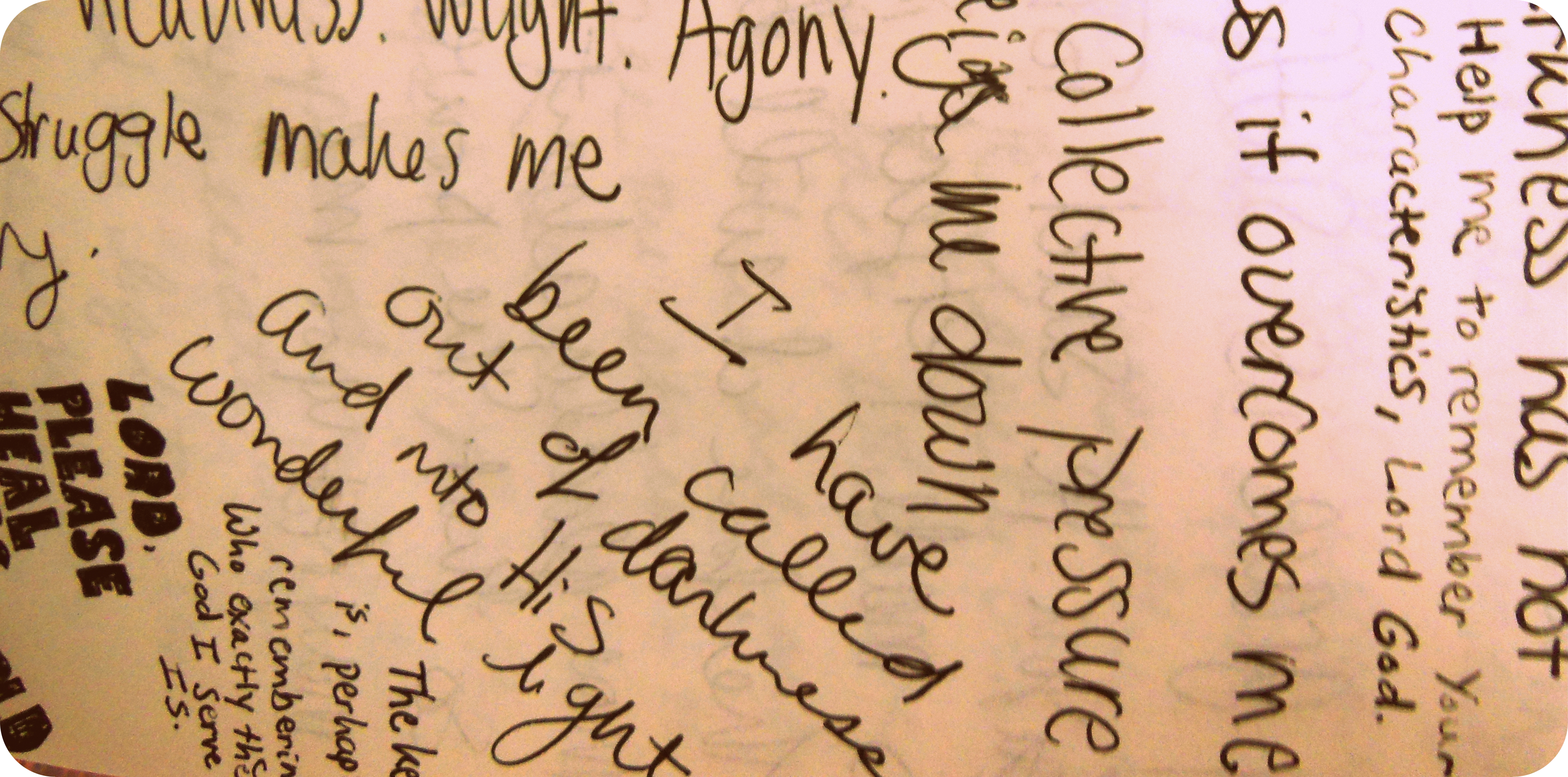
Writing as Worship: How I Write Spoken Word
As I mentioned in my last post, every Saturday for the next few weeks I’m going to be posting some ideas for using writing as worship, and incorporating writing into your quiet times. You can read my previous post for a few basics.
Today let’s talk about spoken word! Spoken word is basically poetry that’s meant to be read out loud. If there are any rules, I don’t know them. Spoken word can sound different based on the topic and the artist reciting the piece. Each writer seems to have their own rhythm, and I love listening to the different unique styles. You can find tons of examples on YouTube. I love some of the stuff put out by P4CM.
I tend to write a lot about things I’m going through. I write about identity, and anxiety, and hearing truth over lies. My poems often begin with me talking about an issue I’m facing. It’s kind of a way for me to vent and bring my issues into the light. Then I move on to writing and speaking the truth about those issues. For example, my spoken word “Loved” begins with me being frustrated about listening to lies again, and then spends the rest of the time pointing out truth after truth after truth about the way God loves me. Sometimes I will finish a poem with praise to God for His goodness.
I love spoken word because I feel like my mind is in a war. It’s so easy for me to believe lies. But there’s something so powerful about audibly saying, “No! This is the truth!” Saying God’s promises and truth’s out loud is like winning a battle. I can’t listen to lies when I’m speaking truth.
In order to write truth and speak truth, I have to know what that truth is. When I write spoken word I often have a Bible or two open on the table, looking up verses, jotting down truths in my journal, and using those in the pieces I’m writing. For example, the first spoken word piece I wrote, “Loved” was put on my heart in Uganda, when God was teaching me about His love. There are several pages in my journal from that time filled with Bible verses about love, and things jotted down from the footnotes in my study Bible about love. If you read the spoken word that came from all of that, you’ll see a lot of it is just a paraphrasing of what God says in His word about love. Some taken from Romans, some from Isaiah, some from other places too. All collected in one place so I can audibly say, “I don’t have time for lies. I am loved.”
Your process may end up looking different! But if you want to try writing some spoken word by following my process, here are a few tips.
1. Pray! Ask God what He wants to teach you about Himself. Ask what He wants you to write. And then sit quietly for a bit and listen.
2. Is there a particular issue you are struggling with in your life? Spoken word, poetry, really any type of writing is a great way to deal with that. So start your poem by talking about the problems you’re facing. Of course you can just make a poem of praise, too, without focusing on problems or issues. Maybe you’re having an amazing day. Then go ahead and write about that!
3. Dig into the Word! If you’re struggling with feeling unloved, dig in and discover what the Bible says about how loved you are. If you’re struggling with worry, research what the Word says about that, and what it says about the Lord being our provider. Whatever it is, look into it. Or if you just want to write a poem about how amazing God is, go for it! Learn all you can about His awesome qualities.
4. Take notes as you study. Feel free to jot them down any which way in your journal, or use markers, or write in bubble letters or whatever. For some reason, writing sort of chaotically in an unorganized way makes me feel more creative. But that may be the opposite of what you prefer. Just don’t be afraid to try new things!
5. Pray again. Pray through the entire process, actually.
6. Write. Haha, I wish I could offer you more detailed advice than that. But remember, writing should be about glorifying God and not producing a certain number of pages. Just enjoy the process of getting into the Word, learning more about Him, hearing His voice. Take all the notes you’ve gathered, and make something with it. A short poem, a long poem, a list of truth statements. It may not look like what you intended in the beginning. That’s okay! Have fun with it. Don’t feel like you have to write in complete sentences, and certainly don’t feel the need for paragraphs.
7. A note about rhythm and rhyme: I don’t know really know how to explain how to give your stuff rhythm and make your stuff rhyme. Often the rhyming takes work. Lots of sitting there staring at the wall or pacing around the living room searching for just the right word. To get the rhythm right, I recommend reading your piece out loud as you write it. You will get a better idea of how it’s coming together.
8. Don’t get frustrated if it isn’t turning out the way you want or if you’re having trouble finishing it. Sometimes, the piece may come together over several days or even months. Sometimes, God reveals things to me a little bit at a time, teaching me things slowly, giving me things to process. At the end I’m often at a very different place than I was when I started. I’ve learned something. I’ve grown because of spending time with God. Listen to His voice. Just enjoy spending time with Him writing!
Well. By now I’ve either inspired you or thoroughly confused you. Remember, this is just my process. Yours may look completely different!
Now here’s a little activity to get you started.
Some of my spoken word poems are based entirely on pieces of Scripture. Sometimes a verse catches my eye when I’m reading the Bible and I feel the need to write about it. Recently I had been meditating on Psalm 138. Go ahead and read it. Ask God to speak to your heart.
1 I will praise you, Lord, with all my heart;
before the “gods” I will sing your praise.
2 I will bow down toward your holy temple
and will praise your name
for your unfailing love and your faithfulness,
for you have so exalted your solemn decree
that it surpasses your fame.
3 When I called, you answered me;
you greatly emboldened me.
4 May all the kings of the earth praise you, Lord,
when they hear what you have decreed.
5 May they sing of the ways of the Lord,
for the glory of the Lord is great.
6 Though the Lord is exalted, he looks kindly on the lowly;
though lofty, he sees them from afar.
7 Though I walk in the midst of trouble,
you preserve my life.
You stretch out your hand against the anger of my foes;
with your right hand you save me.
8 The Lord will vindicate me;
your love, Lord, endures forever—
do not abandon the works of your hands.
I have a “Revised Standard Version” Bible, and I love the way it puts verse 8:
“The LORD will fulfill his purpose for me;
thy steadfast love, O LORD, endures forever.
Do not forsake the work of thy hands.”
I like the way the New King James version of the Bible words verses 3, 7, and 8:
3 In the day when I cried out, You answered me,
And made me bold with strength in my soul.
7 Though I walk in the midst of trouble, You will revive me;
You will stretch out Your hand
Against the wrath of my enemies,
And Your right hand will save me.
8 The Lord will perfect that which concerns me;
Your mercy, O Lord, endures forever;
Do not forsake the works of Your hands.
What stands out to you in this passage? Pray. Ask God to speak to you. Ask Him to put something on your heart and onto the page. Pick something and write about it. There’s a lot to choose from! You could write your own psalm of praise based on the characteristics of God talked about in this Psalm. You could write about God’s love and faithfulness. Or write about a time when you called and God answered. Write about God’s glory. Write about what it’s like to walk in the midst of trouble. What does that feel like? What does it look like? Write about God preserving your life and reviving you. Write about God fulfilling His purpose for you. Write about Him not abandoning the work that He’s started. Write about His enduring mercy.
Don’t freak out. Have fun!
